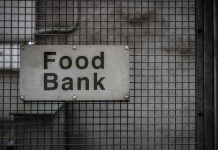THUNDER BAY – Food banks and other local food organizations across Canada are facing increased demand for their services and added pressure from shortages in donations and volunteers. Now more than ever, they need continued support to offer the crucial services Canadians rely upon to feel safe and healthy.
“The hard work and long hours these local agencies and volunteers have put in during the pandemic to make sure those in need didn’t go without is to be commended. Ensuring they had the financial resources to continue to serve the community was important, and I’m glad our government stepped up to the plate to provide them with this much-needed funding,” said Marcus Powlowski, Member of Parliament for Thunder Bay – Rainy River.
Marcus Powlowski, Member of Parliament for Thunder Bay Rainy River, visited the Regional Food Distribution Association, where he announced $413,210 from the Government of Canada to improve food security for residents in his riding facing social, economic and health impacts of the COVID-19 pandemic.
The funds were distributed between the following organizations:
Regional Food Distribution Association $198,150
Canadian Red Cross $100,000
Our Kids Count of Thunder Bay Inc. $10,000
NorthWind Family Ministries $8,360
Lac Des Mille Lacs First Nation $20,000
The Salvation Army Fort Frances $15,000
Community and Family Services
Naicatchewenin First Nation $21,700
Anishinaabeg of Naongashiing $20,000
Big Grassy First Nation $20,000
This funding is part of the $100 million Emergency Fund for food security announced by Prime Minister Trudeau in April to position food banks and local food organizations early in the pandemic to respond to increased community needs.
Key national food security organizations have been instrumental in distributing this funding, including the Breakfast Club of Canada, Community Food Centres Canada, Food Banks Canada, Second Harvest, and the Governing Council of the Salvation Army in Canada.
More than 1,800 food banks and local food organizations across Canada have been helped by the funds from the Prime Minister’s announcement, which is estimated will help serve over 2 million Canadians with 6 million meals.
“When a large portion of Canada was shutting down at the onslaught of the pandemic, food banks stayed the course, kept serving the most vulnerable, and even increased food distribution to fill the void. This was possible because the Federal Government immediately offered support and leadership. They gave us stability when all around us community services were closing doors,” commented Volker Kromm, Executive Director, Regional Food Distribution Association.
Quick Facts
- According to Statistics Canada, one in seven Canadians indicated that they live in a household where there was food insecurity over a one month period during the COVID-19 pandemic.
- In 2019, there were 1.1 million visits to food banks and 5.6 million meals served on average each month.
- The $100 million Emergency Fund for food security investment was divided as follows:
- $50 million Food Banks Canada
- $45 million divided evenly between Community Food Centres Canada, Second Harvest, Salvation Army, and Breakfast Club of Canada.
- Up to $5 million for local-level organizations who serve people experiencing food insecurity, including $800,000 for La Tablée des Chefs to help prepare and distribute meals mainly across Quebec to vulnerable populations through food banks.
Associated links





